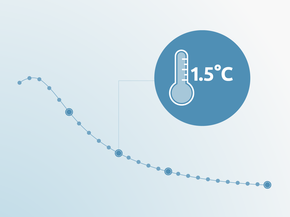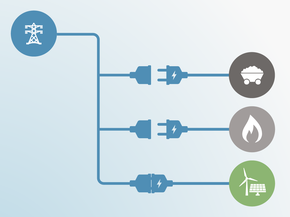Country summary
Overview
Egypt's second climate plan (NDC), submitted to the UNFCCC in June 2023, is almost identical to its predecessor, except for a slightly revised emissions reduction target in the power sector. As Africa's second largest fossil gas producer, Egypt's focus on expanding fossil gas production and exports has largely overshadowed recent investments in renewable energy. The current 2030 target would still see emissions continuing to rise, surpassing even the levels expected with the current policies in place. The CAT continues to rate Egypt’s overall climate action as “Highly insufficient”.
The updated NDC still lacks transparency, making any quantitative assessment difficult. Egypt could easily overachieve its NDC target with the policies it already has in place. Egypt’s target is conditional on international support, but it doesn't specify an unconditional component. To meet the requirements of the Paris Agreement, the government needs to submit a further strengthened and transparent target, spelling out its unconditional component.
In 2022, a number of governments, development banks and private financiers committed to deliver USD 10 bn in finance through the Nexus of Water, Food and Energy (NWFE) Program, a platform created to support the Egypt’s climate actions. This initiative is financed by various international donors, with Germany, the US and the EU providing combined support of USD 500 million to support Egypt’s actions in the energy sector, along with a variety of other contributions towards initiatives targeted at both energy and other sectors.
While Egypt has taken initial steps toward investing in large-scale renewable energy projects, these efforts are overshadowed by even larger investments into fossil fuels, in particular fossil gas. Egypt is responsible for over a third of total fossil gas consumption in Africa and is the continent’s second largest gas producer.
Domestically, Egypt considers fossil gas as a “bridge fuel” and seeks to increase its consumption in nearly all sectors of the economy. Following the invasion of Ukraine, Egypt has significantly increased fossil gas exports to European countries and aims to position itself as a regional energy hub. These developments risk locking Egypt into a high-carbon pathway. A transition away from all fossil fuels holds multiple benefits and is urgently needed to avoid catastrophic climate change.
To improve its climate action, Egypt could:
- Submit an unconditional economy-wide emissions reduction target
- Increase the ambition of its conditional NDC target
- Cease investing in fossil gas exploration and production
- Significantly increase the roll-out of renewable energy
Despite these challenges, the government has put forward a more ambitious renewable energy target, aiming to achieve 42% of renewable energy in its electricity generation mix by 2030 (five years earlier than originally planned). In 2021, renewable energy generation only amounted to 12% of total power generated.
The CAT rates Egypt’s climate targets and policies as “Highly insufficient”. The “Highly insufficient” rating indicates that Egypt’s climate policies and commitments are not consistent with the Paris Agreement’s objectives and lead to rising, rather than falling, emissions.
Egypt’s 2030 emissions reduction target is consistent with warming of up to 4°C when compared to the reductions needed within its borders and its business-as-usual trajectory is consistent with warming over 4°C when compared with its fair share contribution. Egypt’s current policies would result in emissions reductions well below its target, but still only in line with 3°C warming.
Egypt has taken its first steps toward investing in large-scale renewable energy projects, but these remain much smaller in scale than investments into fossil fuel-based energy sources, in particular fossil gas. Egypt is Africa’s second largest fossil gas producer and it is making significant investments into new oil and gas production and exploration.
The CAT rates Egypt’s policies and action as “Insufficient” when compared to its fair share. The “Insufficient” rating indicates that Egypt’s climate policies and action in 2030 need substantial improvements to be consistent with the 1.5°C temperature limit. If all countries were to follow Egypt’s approach, warming would reach over 2°C and up to 3°C.
The full policies and action analysis can be found here.
The CAT rates Egypt’s 2030 NDC target as “Highly insufficient”. Egypt's NDC includes a conditional mitigation target comprised of a quantified emissions reduction below a business-as-usual scenario in three sub-sectors (electricity, transport and oil & gas) as well as a qualitative list of policies and measures in other sectors. The lack of transparency makes the target difficult to assess. The CAT estimates that the target would lead to emissions rising substantially—by around 50% compared to today’s levels and that it will be overachieved with already implemented policies.
To receive a 1.5°C compatible rating for its conditional NDC target (what the CAT refers to as an ‘Conditional NDC target against modelled domestic pathways’), Egypt would need to commit to reducing its emissions by approximately 25% by 2030 compared to today’s level—with international support.
Egypt has not included an unconditional target or component in its second NDC update. In the absence of such a target, the CAT takes Egypt’s estimated 2030 emissions under a business-as-usual scenario as its unconditional commitment and rates it “Critically insufficient”.
The “Critically insufficient” rating signals minimal to no action and is not at all consistent with the 1.5°C temperature limit. Egypt’s unconditional contribution as the CAT has defined it is not in line with any interpretation of a fair approach to meeting the 1.5°C limit. If all countries were to follow Egypt’s approach, warming would exceed 4°C.
Egypt would need to roughly stabilise emissions at today’s levels to meet its fair share of the global mitigation effort to keep temperature rise below 1.5°C.
Egypt does not have a net zero target.
Further analysis
Latest publications
Stay informed
Subscribe to our newsletter






